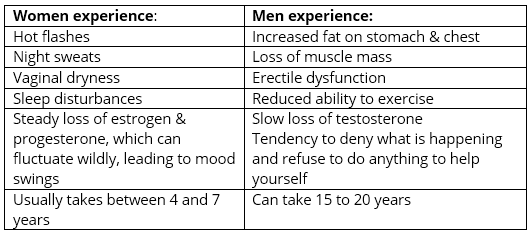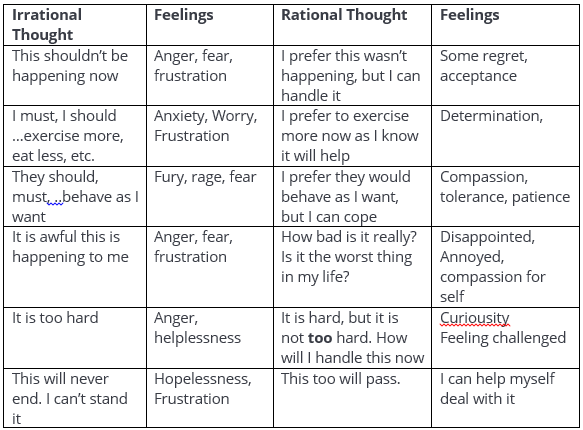One of my newsletter readers asked me recently whether I could offer any advice for her memory problems and difficulty concentrating while she was experiencing perimenopause.
My research uncovered some very interesting information. Not only do women go through the effects of hormonal changes, which usually start between ages 45 and 50. Men also start their hormonal changes at roughly the same age. Male menopause is often a slower, less dramatic process, but it lasts longer. Generally, after the age of 40, testosterone declines at the rate of 1% a year.
Here are the similarities in the effects on our brains of our age-related hormonal changes:
- Less dependable memory
- Lack of mental clarity
- More difficulty concentrating
- More easily distracted
- Irritability
- Feeling gloomy
- Lower libido
And of course, there are some differences between the experiences of women and men:

As Mae West said, “Getting old isn’t for the faint of heart.”
So let’s get to work. Here are several things you can do to relieve some of the symptoms of menopause and help you to ease through it gracefully.
1. Notice when you are saying irrational statements to yourself. Remember your brain believes everything you say. It will react as if what you are saying is real, and that will make you feel worse and less able to cope.
2. If your partner is about the same age, then the more compassion and tolerance you can develop for each other, the easier the transition will be.

3. Getting enough sleep is a challenge in today’s world, but enough sleep is critical to your brain health, your memory, your ability to learn and retain learning, and your ability to concentrate. If you can get 7-8 hours of sleep regularly, you will be in much better shape to deal with the other problems.
4. Most of us tell ourselves we should exercise more but then not do it. Most of us are rarely “in the mood” to exercise, and we promise ourselves we will start tomorrow. If you are going through menopause, exercise will help you in many ways:
- Increased muscle strength
- Better sleep
- Improved mood
- Less memory decline
- Some weight loss
- Balances your neurotransmitters, which improves brain function
- Improves energy and vigour
- Less bone thinning, increased bone density
- Moving big muscles increases brain-derived neurotrophic factor (BDNF) in your blood, which literally grows more brain cells. Dr. John Ratey calls BDNF Miracle-Grow for the brain.
5. Make a real effort to lower your stress level. The pandemic has raised our stress levels dramatically. Going through menopause is adding to that burden. Your brain is your most precious asset. Nothing is more important than a healthy brain. Improve your brain health by:
- Taking more restful short term and longer-term breaks
- Working fewer hours
- Spending more time with family and friends
- Laughing, singing, dancing, and/or playing music
- Returning to a much-loved sport or starting a new sport you want to try
- Starting or returning to a hobby that absorbs you
- Doing anything you enjoy different from your usual routine
6. Enjoy your food and lose weight at the same time.
- Consider a system like NOOM – see https://www.forbes.com/health/body/noom-diet-review/
- Try increasing vegetables, fruit, nuts, whole grains, and beans
- Consider reducing meat and increasing fish and seafood
- Reduce foods containing white flour and sugar
7. Build your Cognitive Reserve. You can think of cognitive reserve as your brain’s ability to improvise and find alternate ways of getting a job done. Just like a powerful car that enables you to engage another gear and suddenly accelerate to avoid an obstacle; your brain can change the way it operates and thus makes added resources available to cope with challenges. Cognitive reserve is developed by a lifetime of education and curiosity to help your brain better cope with any failures or declines. You can Build Your Cognitive Reserve by:
- Keep learning new things – sight, sounds, new friends
- Meet new people, read more books, learn a new language
- Learn to play a musical instrument, or learn to dance or to sing
- Develop an engaging new hobby
If you are facing menopause or any other challenges of getting older, meet them with curiosity and enthusiasm. Remind yourself of difficulties you have handled in the past and treat your current condition as an interesting experience.
As Bette Davis says, “Old age ain’t no place for sissies.”

